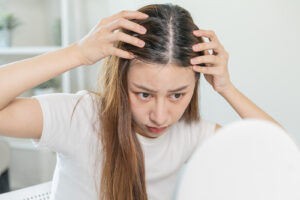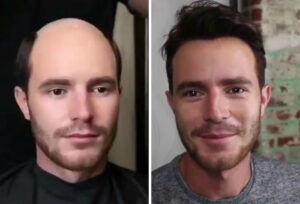Hair is more than just a part of our appearance. It’s often tied to identity, confidence, and self-expression. For women experiencing hair loss, the journey can be both emotionally and physically challenging. While thinning hair and shedding are often thought of as “men’s issues,” millions of women face the same struggle.
In 2025, the good news is that medical advancements and non-surgical options are more effective and accessible than ever before. Whether you’re just starting to notice hair thinning or are dealing with more advanced hair loss, understanding the root cause and knowing your treatment options is the first step.
What Causes Hair Loss in Women?
An estimated 30 million women in the U.S. are affected by hereditary hair loss (female pattern hair loss)—making it the most common cause of thinning hair in women. Hair loss in women is complex and can be triggered by a variety of factors. Identifying the underlying cause is essential for choosing the most effective treatment.
1. Hormonal Imbalances
Hormones play a huge role in hair health. Imbalances related to thyroid function, menopause, polycystic ovary syndrome (PCOS), or postpartum changes can all lead to hair thinning or shedding.
Androgenic alopecia, also known as female pattern hair loss, is often hereditary and driven by hormones. It typically results in thinning at the crown and widening of the part line rather than complete baldness.
2. Stress and Trauma
Stress—whether physical, emotional, or psychological—can wreak havoc on the body, including your hair. One of the most common conditions triggered by stress is telogen effluvium, where a significant number of hair follicles shift prematurely into the resting (telogen) phase of the hair growth cycle. This typically results in excessive shedding two to three months after the stressor occurs.
While telogen effluvium is usually temporary, chronic stress can prolong the shedding and make recovery more difficult. Stress can also exacerbate other underlying causes of hair loss, including hormonal imbalances and autoimmune conditions.
Common stress-related triggers for hair loss in women include:
- Major surgery or hospitalization
- High fevers or severe illness
- Significant weight loss (especially rapid dieting)
- Emotional trauma such as divorce, grief, or abuse
- Ongoing anxiety or depression
- Postpartum hormonal changes
- Physical injuries or accidents
- Major life changes or upheaval (e.g., job loss, moving)
3. Nutritional Deficiencies
Your hair needs the right fuel to grow strong, and that means getting the proper balance of vitamins, minerals, and macronutrients. Nutritional deficiencies are an often-overlooked cause of hair thinning in women, but they’re incredibly common—especially among those following restrictive diets, managing chronic conditions, or struggling with absorption issues like IBS or celiac disease.
A lack of critical nutrients can weaken hair strands, slow growth, and even lead to increased breakage or shedding. Thankfully, once diagnosed, most deficiencies can be corrected with targeted supplementation and dietary changes.
Key nutrients essential for healthy hair growth include:
- Iron: Iron deficiency is one of the most common causes of hair shedding in women. Low iron levels reduce the oxygen supply to hair follicles, which impairs growth.
- Vitamin D: Plays a crucial role in follicle cycling and overall scalp health. Many women are deficient, especially those who work indoors or live in northern climates.
- Zinc: Essential for tissue growth and repair, including hair follicle regeneration. Zinc also helps maintain oil glands on the scalp.
- Protein: Hair is made primarily of keratin, a protein. Insufficient protein intake can lead to weakened, brittle strands and stunted growth.
- Biotin (Vitamin B7): A deficiency in biotin is rare but can lead to thinning hair and brittle nails.
- Omega-3 Fatty Acids: These healthy fats help nourish hair follicles, promote shine, and reduce inflammation on the scalp.
- Vitamin B12: Vital for red blood cell production and oxygen transport to the scalp and follicles—especially important for women following vegetarian or vegan diets.
- Folate: Works with B12 to promote healthy cell division, which is crucial for hair growth.
- Magnesium: Helps regulate calcium, which plays a role in hair follicle function.
4. Medications and Medical Conditions
Certain medications used to treat high blood pressure, depression, or autoimmune diseases can cause hair loss as a side effect. Medications that may cause hair loss include:
- Blood pressure medications (beta-blockers, ACE inhibitors)
- Antidepressants and mood stabilizers (SSRIs, lithium)
- Hormonal therapies (such as birth control pills or hormone replacement therapy)
- Chemotherapy drugs (often cause temporary total hair loss)
Conditions like lupus, anemia, and diabetes can also impact the hair cycle.
5. Hairstyling Habits
While styling may seem harmless, some everyday beauty routines can cause long-term damage to hair follicles and scalp health. Over time, repeated mechanical stress, chemical exposure, and heat damage can lead to a condition known as traction alopecia—a form of hair loss caused by prolonged tension or trauma to the scalp.
Traction alopecia is one of the few preventable causes of hair loss, but it’s often overlooked until the damage is already significant.
Diagnosing Women’s Hair Loss in 2025
In 2025, diagnosing hair loss has become far more precise, thanks to innovations in scalp imaging, hormone testing, and genetic analysis. At Eldorado Hair Restoration Center, our approach includes:
- Scalp and hair analysis using advanced digital microscopes
- Comprehensive blood tests to check hormones, thyroid levels, and nutrition
- Personal consultation to review medical history and lifestyle factors
This allows us to develop a personalized treatment plan tailored to each woman’s unique needs.
The Best Treatments for Women’s Hair Loss in 2025
There is no one-size-fits-all solution for women’s hair loss. At Eldorado, we offer a full spectrum of the most advanced treatments to restore hair health, density, and confidence.
1. Laser Hair Therapy
Low-level laser therapy (LLLT) is a non-invasive treatment that uses red light wavelengths to stimulate hair follicles and improve scalp circulation. Women with thinning hair often see improvements in density and shedding within a few months. Current technology offers portable laser caps and in-office laser domes with higher precision and comfort than ever before.
2. Hair Restoration Systems for Women
Our custom-designed non-surgical hair systems give clients the look and feel of natural hair without surgery. Each system is:
- Fully breathable and lightweight
- Designed to match your scalp and hair type
- Secure, durable, and undetectable
This option is ideal for women who want immediate results without waiting months for regrowth.
3. PRP Therapy (Platelet-Rich Plasma)
PRP uses a small amount of your own blood, which is processed to concentrate the growth factors. When injected into the scalp, PRP stimulates dormant follicles and prolongs the growth phase of hair. This is especially effective for early-stage hair loss. PRP therapy has become even more powerful when combined with microneedling or exosome treatments, enhancing cellular repair.
4. Hair Transplants for Women
While less common than in men, female hair transplant surgery is a proven option for women with stable hair loss patterns. Follicular unit extraction (FUE) is the preferred method, offering natural-looking results with minimal scarring.
Our expert surgical team performs transplants with attention to female-specific hairlines and density needs.
Lifestyle and Supportive Treatments
Nutrition and Supplements
We recommend targeted supplements rich in:
- Biotin
- Zinc
- Vitamin D
- Iron
- Omega-3 fatty acids
Our team can recommend reputable, evidence-backed products and nutritional guidance based on your lab results.
Stress Management
Since stress plays a major role in hair loss, we encourage incorporating relaxation techniques like yoga, therapy, journaling, deep breathing, or meditation to support your hair restoration journey.
According to a 2025 study published in The Faseb Journal, psychological stress can impair hair follicle stem cell function and disrupt the hair growth cycle, leading to prolonged shedding and delayed regrowth.
Chronic stress raises cortisol levels, which not only affects your immune system and sleep but also alters hormonal balance—making conditions like telogen effluvium more likely to occur. By managing stress proactively, many women see reduced shedding and improved regrowth over time.
Scalp Health
A healthy scalp is essential for growing healthy hair. Think of your scalp as the soil in which your hair grows—if the environment is unbalanced, dry, inflamed, or clogged, the follicles can’t function properly, and hair growth slows or weakens. In fact, many types of hair loss begin at the scalp long before visible shedding occurs. In 2025, more specialists are emphasizing scalp care as a foundation for hair restoration, especially for women experiencing early signs of thinning or breakage.
Why Choose Eldorado for Women’s Hair Loss Solutions?
With over 40 years of experience, Eldorado Hair Restoration Center in Baltimore is a trusted leader in both surgical and non-surgical hair restoration for women and men. We believe every woman deserves a solution that works for her lifestyle, goals, and budget.
Our team is committed to compassionate care, clear education, and stunning results. We stay at the forefront of innovation, offering the best women’s hair loss services in Maryland in 2025 and beyond.
Contact Eldorado Hair Restoration Center
Are you ready to take control of your hair loss journey?
Schedule a free hair analysis with the experts at Eldorado today. Whether you’re in the early stages of women’s hair loss or looking for a transformative hair system, we’re here to help. Contact us now.





